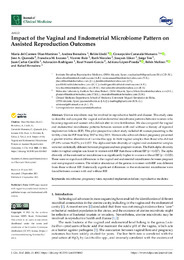Por favor, use este identificador para citar o enlazar este ítem:
https://hdl.handle.net/11000/34655
Impact of the Vaginal and Endometrial Microbiome Pattern on Assisted Reproduction Outcomes
Título :
Impact of the Vaginal and Endometrial Microbiome Pattern on Assisted Reproduction Outcomes |
Autor :
Díaz Martínez, María del Carmen 
Bernabeu, Andrea
Lledó, Belén
Carratala-Munuera, Concepcion 
QUESADA, JOSE ANTONIO 
Lozano, Francisca M.
Ruiz, Vicente
Morales, Ruth
Llácer, Joaquín
Ten, Jorge 
Castillo, Juan Carlos 
Rodríguez, Adoración
NOUNI GARCÍA, RAUF 
Lopez-Pineda, Adriana 
Moliner, Belén  |
Editor :
MDPI |
Departamento:
Departamentos de la UMH::Medicina Clínica
Departamentos de la UMH::Patología y Cirugía |
Fecha de publicación:
2021-09-08 |
URI :
https://hdl.handle.net/11000/34655 |
Resumen :
Uterine microbiota may be involved in reproductive health and disease. This study aims to describe and compare the vaginal and endometrial microbiome patterns between women who became pregnant and women who did not after in vitro fertilization. We also compared the vaginal and endometrial microbiome patterns between women with and without a history of repeated implantation failures (RIF). This pilot prospective cohort study included 48 women presenting to the fertility clinic for IVF from May 2017 to May 2019. Women who achieved clinical pregnancy presented a greater relative abundance of Lactobacillus spp. in their vaginal samples than those who did not (97.69% versus 94.63%; p = 0.027. The alpha and beta diversity of vaginal and endometrial samples were not statistically different between pregnant and non-pregnant women. The Faith alpha diversity index in vaginal samples was lower in women with RIF than those without RIF (p = 0.027). The alpha diversity of the endometrial microbiome was significantly higher in women without RIF (p = 0.021). There were no significant differences in the vaginal and endometrial microbiomes between pregnant and non-pregnant women. The relative abundance of the genera in women with RIF was different from those without RIF. Statistically significant differences in the endometrial microbiome were found between women with and without RIF.
|
Palabras clave/Materias:
microbiome
pregnancy rates
repeated implantation failure
reproductive medicine |
Tipo de documento :
info:eu-repo/semantics/article |
Derechos de acceso:
info:eu-repo/semantics/openAccess
Attribution-NonCommercial-NoDerivatives 4.0 Internacional |
DOI :
10.3390/jcm10184063 |
Publicado en:
Journal of Clinical Medicine. 2021 Sep 8;10(18):4063 |
Aparece en las colecciones:
Artículos Patología y Cirugía
|
 La licencia se describe como: Atribución-NonComercial-NoDerivada 4.0 Internacional.
La licencia se describe como: Atribución-NonComercial-NoDerivada 4.0 Internacional.

 La licencia se describe como: Atribución-NonComercial-NoDerivada 4.0 Internacional.
La licencia se describe como: Atribución-NonComercial-NoDerivada 4.0 Internacional.
.png)